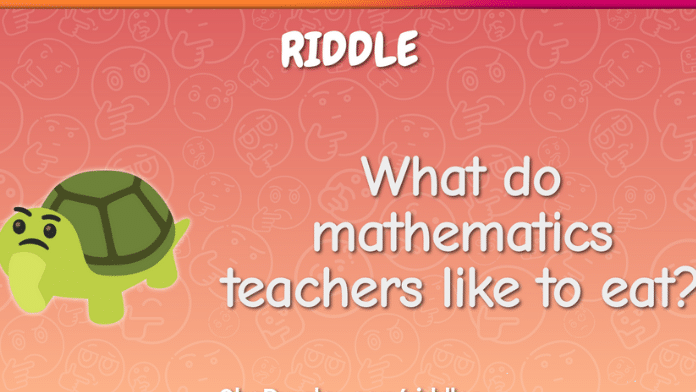Discovering the answer to the riddle “What is the first word in this sentence” requires solving a tricky linguistic puzzle. You must identify the first word in a sentence after being given the sentence in this riddle.
You can successfully solve this riddle and find the elusive initial word by carefully examining the language, considering potential interpretations, and using critical thinking. In order to solve this intriguing riddle, you are willing to use your brain, explore the depths of language, and rise to the challenge.
Why should you solve a riddle that math teachers love to eat?
This intriguing puzzle presents a seemingly implausible situation that is sure to pique your interest. Consider unusual ways of thinking about the problem at hand and distance yourself from preconceived notions in the process. Accept the challenge, enjoy the intellectual inquiry, and decipher the intriguing details of this puzzle. Always remember that you have access to the solution.
What Do Math Teachers Like to Eat Riddles – Solution
To solve the riddle “What do math teachers like to eat?” follow these steps:
- Read the riddle carefully
- Analyze the question
- Focus on the first word
- Consider the self-referential nature of the riddle
- Determine the answer
Here is the answer to the question What do math teachers like to eat?
Answer: Pi
In the riddle, it is implied that math teachers like to eat “pi” because of their enthusiasm and involvement in the subject. The word “pi” is a play on words since it resembles the dessert “pie”. In this way, the riddle mixes the mathematical idea of “pi” with the pun on the term “pie”.
which is a dish that many people enjoy, including math teachers. Riddles are a fascinating and energizing way to challenge our intelligence. They promote language proficiency, critical thinking, creativity and problem-solving skills.
Puzzles promote cognitive growth and intellectual satisfaction by challenging us to think outside the box and consider other perspectives. Accept the call of mystery, solve mysterious puzzles and take on the challenge of deciphering riddles.
How do puzzles improve cognitive skills?
Puzzles have been shown to improve cognitive abilities in different ways. Briefly explain how puzzles could improve cognitive abilities.
1. Critical thinking: Because they often present difficult problems that must be examined and solved, puzzles require the use of critical thinking skills. By solving puzzles, people develop their logical thinking, their evaluation of information, and their ability to connect disparate parts of knowledge.
2. Troubleshooting: People are driven by puzzles to find original answers to puzzling problems. Since individuals must use tactics, consider other points of view, and think outside the box to get to the right answer, this approach promotes problem-solving skills.
3. Recall and memory: In order to understand a puzzle, one must frequently remember and remember minor details. Riddles are a good way for people to practice their memory and recall skills because they teach their brains to store important information and retrieve it later.
4. Language skills: Puns, metaphors, and other language strategies are regularly used in puzzles, all of which improve language proficiency. People can enrich their vocabulary, improve their understanding of language, and gain greater insight into linguistic complexity by analyzing these components.
5. Cognitive versatility: Puzzles often have multiple potential solutions, requiring consideration of various viewpoints and strategies. This encourages cognitive flexibility, allowing people to change their thinking, move from one approach to another, and consider alternative interpretations.
Why are puzzles a fun and engaging activity?
Here are some reasons why solving puzzles is entertaining and interesting:
- Riddles interest us by arousing our curiosity and generating a feeling of excitement.
- Riddles require us to think critically, make connections, and apply our problem-solving skills in order to find the solution.
- Witty and Entertaining: The puzzles frequently include puns, puns, and skillful linguistic maneuvers, bringing a sense of humor to the exercise.
- Language appreciation: Deciphering puzzles allows us to study the intricacies of language, encouraging a deeper understanding and appreciation of linguistic inventiveness.
- Social and cooperative: Deciphering puzzles can be a group activity that encourages interaction, rivalry and cooperation.
- Riddles are an intellectually engaging activity that promotes cognitive development and increases our thinking skills.
- Satisfaction: Solving a puzzle correctly makes you feel accomplished and intellectually satisfied.
